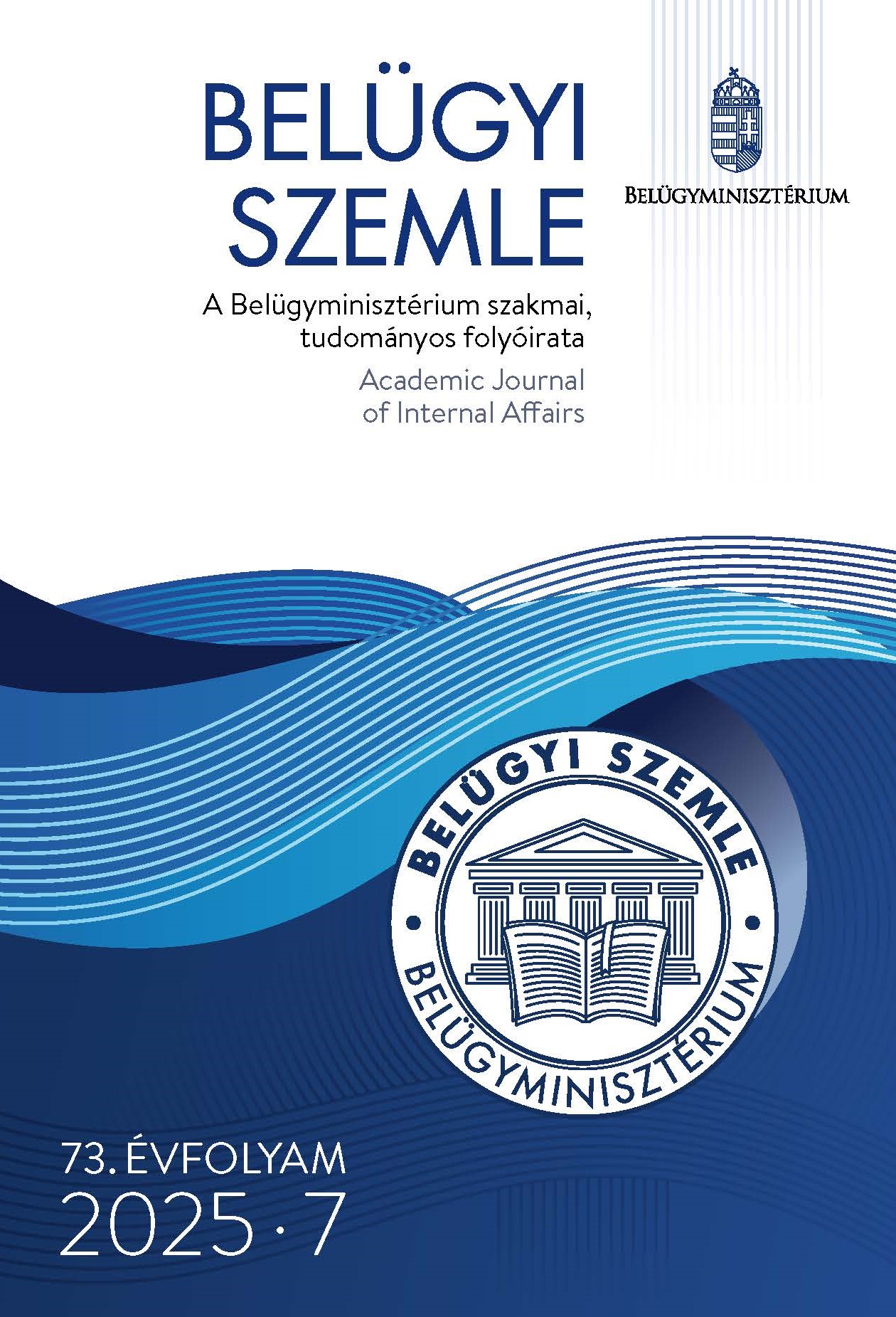Abstract
Aim: The authors of the two-part study present a recently emerging field of science – epigenetics – based on published literature data, illustrating the process of gene expression through traditional genetic and epigenetic examples, as well as results achieved in the field of forensic sciences – genetics and dactyloscopy. The first study presents the basics of epigenetics, intergenerational trauma, and the legal and ethical aspects of epigenetics.
Methodology: The study processes and synthesizes academic papers from a wide range of sciences, including genetics, history, ethics, and law.
Findings: All external and internal environmental factors can cause chemical modifications in our genes, turning them on or off over time. These changes can be passed on, at least in part, to the next generation. Epigenetics research and the use of its results must comply with legal and ethical rules.
Value: The study provides a comprehensive picture of the molecular background of epigenetic inheritance through literature studies and also presents a structured description of the legal and ethical concerns related to epigenetics.
References
Bierer, L. M., Bader, H. N., Daskalakis, N. P., Lehrner, A., Provençal, N., Wiechmann, T., Klengel, T., Makotkine, I., Binder, E. B., & Yehuda, R. (2020). Intergenerational effects of maternal Holocaust exposure on FKBP5 methylation. American Journal of Psychiatry, 177(8), 744–753. https://doi.org/10.1176/appi.ajp.2019.19060618
Callanan, L. (2004). The cloud atlas. Thorndike Press.
Dalpé, G., Huerne, K., Dupras, C., Cheung, K., Palmour, N., Winkler, E., Alex, K., Mehlman, M., Holloway, J. W., Bunnik, E., König, H., Mansuy, I. M., Rots, M. G., Erwin, C., Erler, A., Libertini, E., & Joly, Y. (2023). Defusing the legal and ethical minefield of epigenetic applications in the military, defense, and security context. Journal of Law and the Biosciences, 1–32. https://doi.org/10.1093/jlb/lsad034
Davies, P. F., Manduchi, E., Stoeckert, C. J., Jiménez, J. M., & Jiang, Y. Z. (2015). Emerging topic: Flow-related epigenetic regulation of endothelial phenotype through DNA methylation. Vascular Pharmacology, 62(2), 88–93. https://doi.org/10.1016/j.vph.2014.05.007
Dias, B. G., Maddox, S., Klengel, T., & Ressler, K. J. (2015). Epigenetic mechanisms underlying learning and the inheritance of learned behaviors. Trends in Neurosciences, 38(2), 96–107. https://doi.org/10.1016/j.tins.2014.12.003
Dupras, C., Knoppers, T., Palmour, N., Beauchamp, E., Liosi, S., Siebert, R., Berner, A. M., Beck, S., Charest, I., & Joly, Y. (2022). Researcher perspectives on ethics considerations in epigenetics: An international survey. Clinical Epigenetics, 14, 110. https://doi.org/10.1186/s13148-022-01322-7
Dupras, C., Saulnier, K. M., & Joly, Y. (2019). Epigenetics, ethics, law and society: A multidisciplinary review of descriptive, instrumental, dialectical and reflexive analyses. Social Studies of Science, 49(5), 785–810. https://doi.org/10.1177/0306312719866007
Felsen, I. (1998). Transgenerational transmission of effects of the Holocaust. In Danieli, Y. (Ed.), International handbook of multigenerational legacies of trauma (pp. 43–68). Springer. https://doi.org/10.1007/978-1-4757-5567-1_3
Galton, F. (1875). On men of science, their nature and their nurture. Proceedings of the Royal Institution of Great Britain, 7, 227–236.
Pamzsav H. (2019). Populációgenetika újabb eredménye: genetikai eredetkutatás. Belügyi Szemle, 2019(11). https://doi.org/10.38146/BSZ.2019.11.1
Rothstein, M. A., Cai, Y., & Marchant, G. E. (2009). The ghost in our genes: Legal and ethical implications of epigenetics. Health Matrix: Journal of Law-Medicine, 19(1), 1–62. https://pubmed.ncbi.nlm.nih.gov/19459537/
Santaló, J., & Berdasco, M. (2022). Ethical implications of epigenetics in the era of personalized medicine. Clinical Epigenetics, 14, 44. https://doi.org/10.1186/s13148-022-01263-1
Shen, L., Li, C., Wang, Z., Zhang, R., Shen, Y., Miles, T., Wei, J., & Zou, Z. (2019). Early-life exposure to severe famine is associated with higher methylation level in the IGF2 gene and higher total cholesterol in late adulthood: The Genomic Research of the Chinese Famine (GRECF) study. Clinical Epigenetics, 11(1), 88. https://doi.org/10.1186/s13148-019-0676-3
Smil, V. (1999). China's great famine: 40 years later. British Medical Journal, 319(7225), 1619–1621. https://doi.org/10.1136/bmj.319.7225.1619
Stenz, L., Schechter, D. S., Serpa, S. R., & Paoloni-Giacobino, A. (2018). Intergenerational transmission of DNA methylation signatures associated with early life stress. Current Genomics, 19(8), 665–675. https://doi.org/10.2174/1389202919666171229145656
Tobi, E. W., Goeman, J. J., Monajemi, R., Gu, H., Putter, H., Zhang, Y., Slieker, R. C., Stok, A. P., Thijssen, P. E., Müller, F., van Zwet, E. W., Bock, C., Meissner, A., Lumey, L. H., Slagboom, P. E., & Heijmans, B. T. (2014). DNA methylation signatures link prenatal famine exposure to growth and metabolism. Nature Communications, 5, 5592. https://doi.org/10.1038/ncomms6592
Waggoner, M. R., & Uller, T. (2015). Epigenetic determinism in science and society. New Genetics and Society, 34(2), 177–195. https://doi.org/10.1080/14636778.2015.1033052
Wang, Z., Song, J., Li, C., Li, Y., Shen, L., Dong, B., Zou, Z., & Ma, J. (2020). DNA methylation of the INSR gene as a mediator of the association between prenatal exposure to famine and adulthood waist circumference. Scientific Reports, 10(1), 12212. https://doi.org/10.1038/s41598-020-69120-w
Yehuda, R., Cai, G., Golier, J. A., Sarapas, C., Galea, S., Ising, M., Rein, T., Schmeidler, J., Müller-Myhsok, B., Holsboer, F., & Buxbaum, J. D. (2009). Gene expression patterns associated with posttraumatic stress disorder following exposure to the World Trade Center attacks. Biological Psychiatry, 66(7), 708–711. https://doi.org/10.1016/j.biopsych.2009.02.034
Yehuda, R., Daskalakis, N. P., Bierer, L. M., Bader, H. N., Klengel, T., Holsboer, F., & Binder, E. B. (2016). Holocaust exposure induced intergenerational effects on FKBP5 methylation. Biological Psychiatry, 80(5), 372–380. https://doi.org/10.1016/j.biopsych.2015.08.005
Yehuda, R., Daskalakis, N. P., Desarnaud, F., Makotkine, I., Lehrner, A. L., Koch, E., Flory, J. D., Buxbaum, J. D., Meaney, M. J., & Bierer, L. M. (2013). Epigenetic biomarkers as predictors and correlates of symptom improvement following psychotherapy in combat veterans with PTSD. Frontiers in Psychiatry, 4, 118. https://doi.org/10.3389/fpsyt.2013.00118

This work is licensed under a Creative Commons Attribution-NonCommercial-NoDerivatives 4.0 International License.
Copyright (c) 2025 Academic Journal of Internal Affairs

